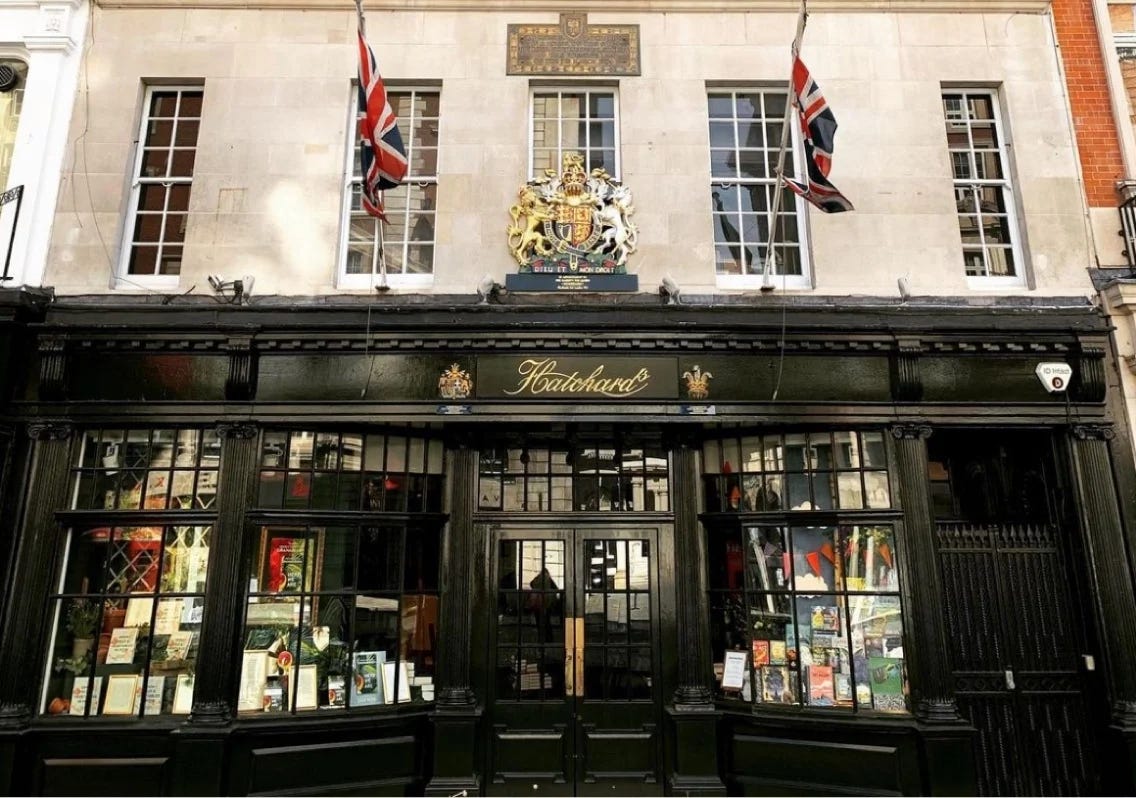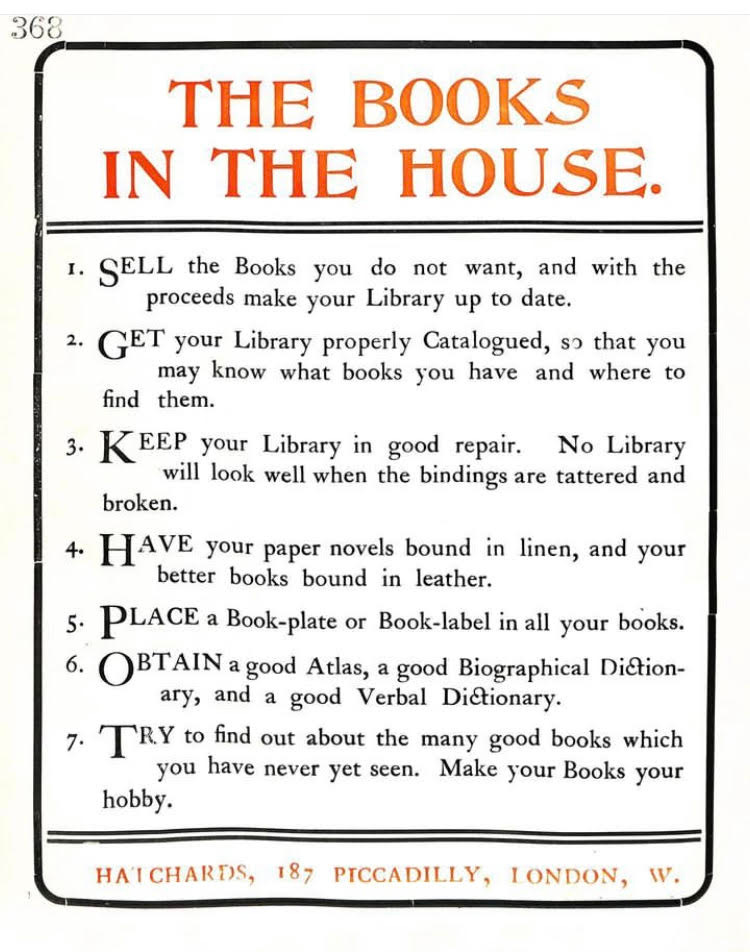In Conversation with Francis Cleverdon
The cutting room floor of an interview with the manager of Hatchards
FRANCIS CLEVERDON: Would it be very very bad of me if I ran downstairs and picked up my coffee?
ET: Of course not. Imagine if I said yes.
{...}
ET: Are you busy today?
FRANCIS CLEVERDON: Completely madly. I’m being flown to New York next week to speak at a PayPal conference, I know nothing about PayPal, they just want to know about Hatchards, so there’s a slight idea of ‘what is going to go wrong next week?’ ‘Oh my God, I better reply to them now!’ sort of thing.
ET: Is it a flying visit?
FRANCIS CLEVERDON: It's a flying visit.Ego
ET: The last time we spoke it was all about Hatchards cropping up in fiction and the wider cultural mythology that the shop has. When you look your name up online lots of glamorous spreads come up of you standing with your hands on your hips outside the store. It struck me as a similar mythology. Do you enjoy that part of your job? FRANCIS CLEVERDON: I mean it’s mad and silly and fun. Some of my colleagues get very worried and self-conscious about it but I’ve got over that. Sod it. You must be slightly careful about what you say as you don’t want to make some terrible farce. The more you do it the more safe you feel which is probably a dangerous thing as you will make me say something disastrous. ET: On the way here I was reading Ego is The Enemy. One of Ryan Holiday’s books, you know? FRANCIS CLEVERDON: Yes. ET: Have you read it? FRANCIS CLEVERDON: No. Is it good? ET: Yes. I mean I was primed to hate it. After the introduction, I was thinking ‘Stillness is not the key! Ego is not the enemy!’ but I was surprised by how good it was. It made me think that the two sides of the writer-bookseller coin might often be associated with ego and reticence, what with your job being far more behind the scenes. How do you experience ego in authors and when managing your own public image? FRANCIS CLEVERDON: I go in awe of authors because I certainly couldn’t do what they do. I couldn’t have the self-confidence to believe that anything I write down is worth reading, and the inner drive to do it is amazing. The thing about all this is that it's nothing to do with me. It's about the shop. My idea of how the shop should be is so deeply driven by the tradition of the shop. There are shops where, for an infinite number of reasons, the staff are very sad and you can always feel that, so I spend quite a lot of time cheering people up or attempting to. And shops that have nasty, political rows between the first floor and the second floor are a nightmare to manage. You can nearly always tell when a shop is basically jolly. There is the side of the books and then there is the side that’s the staff and the people. They are almost equally important. They are undoubtedly equally important. Ego is very difficult because I always wanted to run Hatchards. Running it, it's very easy to be terribly pleased with oneself but I know there are about nine things I’m terribly bad at. ET: In total or in bookselling? FRANCIS CLEVERDON: Oh nine just in bookselling. That ranges from subjects that I’m not particularly good at to working out what the hell it is I’m meant to do next Tuesday.
Transformational Books
ET: A more sentimental one. Is there any one book that changed the trajectory of your life? FRANCIS CLEVERDON: Changing the trajectory of one's life is quite a big deal isn't it? I don’t think so. There are favourite books and comfort books that I reread all the time, well hopefully not all the time, but when there’s trouble one rereads Patrick O’Brian. There are books that I so well remember reading like War and Peace which I read going across America on my own. It was the only book I took. One missed the bus stops as one hared along on the greyhound because it was so marvellous. And I remember reading Money, by Martin Amis. I was around twenty-six at that point and it was just such a wonderful book reminiscent of life in London. I must reread it. ET: Was that when it came out? FRANCIS CLEVERDON: God when did it come out… I think I must have read it late. ET: The thing about doing an English degree now is that there’s one boy for every ten girls and they’ve built their whole personality on reading Money when they were thirteen. Well, I’m glad you didn’t have one transformational pick. In the same vein, do you think it's useful to look at books as tools for personal transformation? FRANCIS CLEVERDON: I think it’s pushing it. You have to be quite fragile in your own personality. There are books that are amazing pictures of other people’s lives: astonishingly correct analyses of how people live, what they should do, how they should do it, relationships and what have you. It's more about a general character forming as opposed to going a different way because of one book. The Martin Amis world is a hard-driven, hard-edged world and you can happily say I don’t want to be that hard-edged and hard-driven, which is why I sell books rather than stocks or shares. To say I’m not going to marry this woman is slightly foolish and self-indulgent in some ways. ET: Do you know Janan Ganesh from the FT? FRANCIS CLEVERDON: Yes. ET: He's on a podcast episode called ‘You have to get into Amis, and you have to get past Amis' which is just that, realising that you actually can marry the woman.
Recommendations
ET: I read a few things after we spoke last time but Assembly was my favourite. Natasha Brown’s book. FRANCIS CLEVERDON: Great book. ET: And then I read Perfume - Suskind - and bought that for about five people. FRANCIS CLEVERDON: Move onto Ingenious Pain next time! ET: Ingenious Pain? FRANCIS CLEVERDON: Ingenious Pain. ET: What was your favourite book published in the last 12 months? FRANCIS CLEVERDON: I really liked. I really liked. Gosh, my mind’s gone completely blank. Actually, I really liked the new Zadie Smith. I thought the Zadie was really fun. And Mick Herron’s last one. ET: Fair enough. Favourite poet? FRANCIS CLEVERDON: Poets I know best are… Are you alright? Shop assistant: I wanted the table and the computer. FRANCIS CLEVERDON: Bad luck! The poets I like and know best are the ones my father worked with. Dylan Thomas, Stevie Smith and Ted Hughes’s generation. I don’t read very much poetry now. The last was Robin Robertson’s new collection and that was good.
Travel
ET: You mentioned taking War and Peace to America before. Do you have other key reading memories tied up with travel? FRANCIS CLEVERDON: I read Women in Love on my Honeymoon. It was just the most wonderful book. I remember reading that lying on the beach and Susan muttering beside me about shouldn’t we go and have supper now. That was one. I spent about six months in Florence and that was marvellous. I was doing the 1950s when I was in Florence. Have you done that bit? ET: No. FRANCIS CLEVERDON: Oh God throw everything out and go and live in Florence for six months. Delicious! So good. In an old-fashioned way, I was being rather impatient with the world and its wife, so I went back to the rebellious bit of the 1950s. I remember reading Lucky Jim sitting on the steps of the Duomo. That was a lovely period. ET: Do you read by decade much? FRANCIS CLEVERDON: Yes I do. One always feels guilty about not reading the new proofs and the old choices. I’ve never read Tristram Shandy. ET: I had to. It was awful. FRANCIS CLEVERDON: Was it? ET: No, it was pretty alright. FRANCIS CLEVERDON: There was a time when lots of meetings would start with introducing yourself via a book you felt guilty you hadn’t read. I’ve never managed to read Little Dorrit. ET: Started many times? FRANCIS CLEVERDON: Started many times. Thought, do I care? ET: Do you know the Camino de Santiago? The pilgrimage. I’m walking that later this summer. FRANCIS CLEVERDON: Yes, what fun! ET: I’m walking it the Porto way round and I wondered what you might recommend to read en route. FRANCIS CLEVERDON: Have you read Gerald Brennan's South from Granada? It’s the wrong place but it’s such a wonderful picture of Iberia (I’m cheating already). I’d do that and the new life of Magellan by what’s his face. ET: Zweig? FRANCIS CLEVERDON: Yes, Stefan Zweig for the Portuguese leg. And finally, I’d do something completely different. Maybe that delicious book A Month in The Country. Have you read that? ET: Yes! I wrote a piece saying that its protagonist had jumped over from The Pickwick Papers. FRANCIS CLEVERDON: Oh! ET: No. No, no, The Rachel Papers. FRANCIS CLEVERDON: Yes, I was wondering how you might have wrangled that.
In May I had the pleasure of interviewing Francis Cleverdon, the manager of Hatchards, for the Oxford Review of Books. The long-form piece that ensued will be available to read this October in the ORBs’ autumn edition.
Letters to the Editors Regarding the 31/07/2024 Publication of Gone Girl Flat
“Just wanted to say that this and your Substack capture that in-betweenness of post-undergrad / pre-everything extraordinarily well. Keep it up!” - TA
“I am in love with your writing (in a really casual and cool way)” - FT
“I love reading you… so keep your head up or smth” - RN
When we learned that the intensity of life thus far may one day be remembered as ‘pre-everything’ the newsroom was, to put it lightly, despondent. Buoyed by the love of nonchalant subscribers we have decided that ‘pre-everything’ is positive, and are now excited to document everything, late-stage everything, and post-everythingism for your entertainment.





